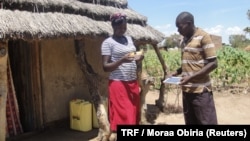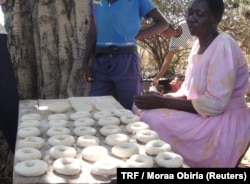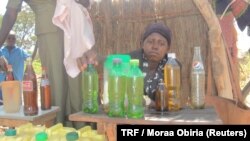Once reliant on seasonal farming jobs to make ends meet, Aguti Rukia is now a successful entrepreneur in Arubela, eastern Uganda.
With the help of a $150 "micro-grant" last year, Rukia and two women from her village started a business buying petrol from fuel stations and selling it in smaller quantities to motorcycle taxis in the area.
"We buy three jerrycans of petrol per week and we make a profit of up to 15,000 Ugandan shillings ($4) from each," explained Rukia, adding that each business partner had personally invested 30,000 shillings ($8) to top up the grant.
Uganda is one of the 30 poorest countries in the world, with 2017 government figures showing over one quarter of the population lives in poverty.
Eastern Uganda is particularly affected, with only 6 percent of households with access to electricity, according to the World Bank.
To boost people's income, a project is helping rural Ugandans set up their own businesses by providing seed funding, training and mentoring.
The initiative, led by U.S. charity Village Enterprise, selects groups of three would-be entrepreneurs based on an assessment of their poverty level, and requires them to raise part of their business capital themselves.
"By giving people ownership of their enterprise we thought they would have a better chance of success," said Winnie Auma, the charity's director in Uganda.
Each venture is limited to three people as it reduces the risk of failure — compared to only two partners — while still being a number small enough to manage, she told the Thomson Reuters Foundation.
Weather and Poverty
Poverty in the East African country is exacerbated by increasingly erratic weather linked to climate change, experts say.
Absalom Ragira from the Tree is Life Trust, a Kenyan charity working to protect the environment, said rising temperatures help pests to breed, destroying farmers' crops and their main source of income.
"At the same time, flash floods can sweep away harvests and livestock," he said.
Before Rukia set up her business with partners Mary Atim and Mary Alinga, the women's income largely fluctuated with the weather.
"We used to rush to people's farms whenever they needed someone to till their land," recalled Rukia.
But those jobs are becoming increasingly scarce, she added.
Seasonal farming jobs are harder to come by in times of drought or floods, local people say, as there are fewer crops left to harvest.
Money - and Respect
After starting off reselling fuel, Rukia, Atim and Alinga have expanded their business by buying and selling groundnut oil for cooking.
Rukia now earns about 75,000 shillings ($20) per week selling petrol, cooking oil and beans — over five times more than when she took up seasonal jobs. The income comes on top of the 60,000 shillings ($16) her husband makes selling brooms.
She said the help starting her business has not only boosted her family's income — allowing them to buy a solar pay-as-you-go kit — but has also earned her her husband's respect.
Atim agrees. "They (men) look at us differently because we can even lend them money or pay our children's school fees," said the mother of four.
Their venture is one of 4,000 businesses created each year in Uganda and Kenya through the grants, said Auma, estimating they have benefited over 200,000 people since 2012.
Grants, Not Loans
Hannah McCandless, a program associate at Village Enterprise, said the micro-grant model works because budding entrepreneurs only receive the cash once they have been through nine months of training on business and financial skills — and they must spend it on their venture.
Each team also joins a savings group, which can act as a safety net for the women and allow them to take out loans as needed, she added.
"As a result only about 5 percent of businesses fail six months after having started," she said.
Hassan Mbaziira, a manager at the Ugandan Ministry of Gender, Labor and Social Development, said micro-grants or cash transfers like the Village Enterprise model are an effective way of tackling poverty.
"Cash transfers allow people to spend money according to their needs, and help them regain a sense of control," he said.
While the government runs its own entrepreneurship and social protection programs, "it is unlikely that they will wipe out poverty on their own", he added, calling for more support from NGOs and civil society.







